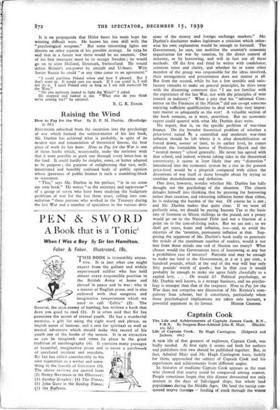Raising the Wind
RETURNING refreshed from the excursion into the psychology of war which formed the subject-matter of his last book, Mr. Durbin has achieved what is probably, in spite of its modest size and renunciation of theoretical finesse, the best piece of work he has done. How to Pay for the War is one of those books which, occasionally, make the reviewer wish that it were possible to push one through every letter-box in the land. It could hardly be simpler, saner, or better adapted to its purpose ; the purpose of enlightening that vast, well- intentioned and horribly confused body of public opinion whose ignorance of public finance is such a stumbling-block to statesmen.
" This," says Mr. Durbin in his preface, " is in no sense my own book." He writes " as the secretary and rapporteur " of a group of seven who have been studying the budgetary problems of war for the last three years, calling into con- sultation " three persons who worked in the Treasury during the last War and a number of specialists in the various divi-
sions of the money and foreign exchange markets." Mr. Durbin's disclaimer makes legitimate a criticism which other- wise his own explanation would be enough to forestall. The Government, he says, can mobilise the country's economic organisation for war by taxation, by the direct control of industry, or by borrowing, and will in fact use all these methods. Of the first and third he writes with confidence, common sense and clarity, and whether he or some other member of the group was responsible for the ideas involved, their arrangement and presentation does not matter at all. But from the second, while he has a few sensible and satis- factory remarks to make on general principles, he shies away with the disarming comment that " I am not familiar with the experience of the last War, nor with the principles of wise control in industry." What a pity that his " informal Com- mittee on the Finances of the Nation" did not co-opt someone enjoying sufficient qualifications to deal with this very impor- tant matter as adequately as the rest! A valuable section• of the book remains, as it were, unwritten. But no economic expert could quarrel with what Mr. Durbin does write.
No expert, that is, on the specific problem of war-time finance. On the broader theoretical problem of whether a price-level raised By a controlled and moderate war-time inflation should be left where it is after demobilisation or forced down, sooner or later, to its earlier level, he comes athwart the formidable hawse of Professor Hayek and the " neutral money " school generally. He never has agreed with that school, and indeed, without taking sides in the theoretical controversy, it seems at least likely that any " distortion " introduced into the economic system by a rise in the general price-level would be a pinprick compared with either the distortions of war itself or those brought about by trying to combine demobilisation and deflation.
One does, however, wonder whether Mr. Durbin has fully thought out the psychology of the situation. The citizen deludes himself into thinking that by pressing for borrowing rather than taxation, and tolerating inflation better than either, he is reducing the burden of the war. Of course he is not ; and Mr. Durbin makes that quite clear. If we were all perfectly wise, we should be paying Income Tax at the basic rate of fourteen or fifteen shillings in the pound, not a penny would go on to the National Debt and not a fraction of a point on to the cost-of-living index. But we are not ; so we shall get taxes, loans and inflation, too—and, to avoid the miseries of the 'twenties, permanent inflation at that. Sup- posing the argument of Mr. Durbin's book really to penetrate the minds of the maximum number of readers, would it not tear from those minds one veil of illusion too many? What chance would the Government have of borrowing at any but a prohibitive rate of interest? Patriotic zeal may be ,enough to make me lend to the Government, at 2 or 3 per cent., a hundred pounds, which at the end of the war will buy only fifty pounds' worth of goods ; but in that case it would probably be enough to make me agree fairly cheerfully to a capital levy. . . . Or would it? Political psychology, as Mr. Durbin well knows, is a strange business, and no psycho- logy is stranger than that of the taxpayer. How to Pay for the War does not comprise any discussion of Mr. Keynes's com- pulsory loan scheme, but it constitutes, particularly when these psychological implications are taken into account, a
powerful argument in its favour. HONOR CROOME.








































 Previous page
Previous page